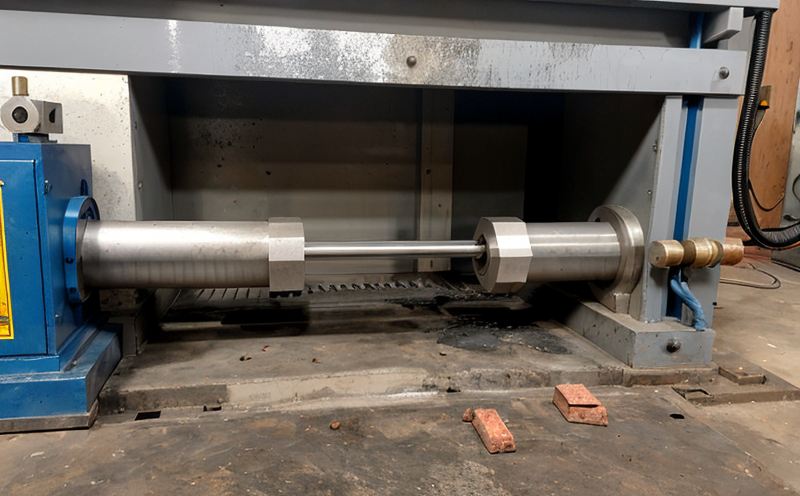ASTM E1820 Fracture Toughness & J-Integral Testing
The ASTM E1820 standard provides a comprehensive approach to measuring the fracture toughness (KIc) and J-integral of materials, which is critical for assessing material integrity and durability. This testing method is widely used in industries such as aerospace, automotive, civil engineering, and manufacturing where component reliability under dynamic loading conditions is paramount.
Fracture toughness quantifies a material's ability to resist crack growth under stress. The J-integral parameter assesses the total energy required for crack propagation, providing insights into the material's resistance to fracture initiation. ASTM E1820 testing involves subjecting specimens with pre-cracked notches to controlled loading until failure occurs. The test data can be used to predict a material’s behavior under various stress conditions and helps in validating design parameters.
The procedure typically employs compact tension (CT) or double-edge notched bend (DENB) specimens, depending on the specific application. Specimen preparation is critical; it involves creating precise notches with controlled geometry and size according to ASTM E1820 guidelines. The testing apparatus includes sophisticated hydraulic or pneumatic presses capable of applying loads up to several tens of kilonewtons.
Testing protocols are meticulously followed, ensuring that all parameters such as load rate, environmental conditions, and specimen orientation conform to the standard's requirements. Data analysis involves sophisticated software tools that calculate KIc values from stress intensity factor (SIF) measurements collected during testing. These results provide a quantitative measure of material toughness, which is essential for quality control and compliance verification.
The ASTM E1820 method is widely recognized in the global community for its accuracy and reliability. It supports regulatory requirements for product certification and helps industries comply with international standards such as ISO 9856:2013 (Equivalent to ASTM E1820). This testing service plays a crucial role in enhancing material integrity by identifying potential weaknesses before they lead to catastrophic failures.
For aerospace components, for instance, the results from ASTM E1820 tests can guide the design of safer and more reliable structures. In automotive manufacturing, these tests ensure that materials used in critical systems meet stringent durability requirements. Civil engineers use this data to assess the integrity of large structural elements like bridges and offshore platforms.
By leveraging ASTM E1820 testing, organizations can improve product performance, reduce maintenance costs, and enhance safety standards across various sectors.
- International Acceptance: ASTM E1820 is widely accepted in industries such as aerospace, automotive, civil engineering, and manufacturing. It aligns with international standards like ISO 9856:2013, ensuring global consistency in material testing.
Benefits
The benefits of ASTM E1820 fracture toughness and J-integral testing extend across multiple dimensions, including quality assurance, regulatory compliance, and innovation. By employing this method, organizations can:
- Ensure Compliance: ASTM E1820 aligns with international standards, ensuring that materials meet stringent industry regulations and specifications.
- Increase Product Reliability: The test provides critical insights into material behavior under dynamic loading conditions, enhancing the reliability of components in high-stress environments.
- Promote Innovation: By identifying potential weaknesses early, ASTM E1820 testing supports the development of safer and more durable materials.
- Reduce Costs: Early identification of material flaws through ASTM E1820 testing can prevent costly failures and associated downtime.
Additionally, compliance with ASTM E1820 standards enhances an organization's reputation in the market, ensuring that products meet the highest quality standards.
International Acceptance and Recognition
- Aerospace Industry: ASTM E1820 is used to ensure the reliability of critical components in aerospace applications, such as aircraft structures and engines.
- Automotive Sector: The method supports automotive manufacturers in assessing material integrity for safety-critical parts like brakes and chassis systems.
- Civil Engineering: ASTM E1820 is crucial for civil engineering applications, where durability of large structures like bridges and offshore platforms is paramount.
- Manufacturing Industry: This testing method ensures that materials used in manufacturing meet the highest quality standards, enhancing product reliability and safety.
Competitive Advantage and Market Impact
The ASTM E1820 fracture toughness and J-integral testing service offers significant competitive advantages in several key areas:
- Enhanced Product Quality: By identifying material flaws early, organizations can improve the quality of their products, leading to higher customer satisfaction.
- Regulatory Compliance: Ensuring compliance with ASTM E1820 standards helps companies avoid costly penalties and delays in product launches.
- Innovation Support: The insights gained from this testing method can drive innovation by identifying new materials or processes that enhance performance.
- Competitive Edge: By offering products that meet the highest quality standards, organizations can gain a competitive edge in the global market.





